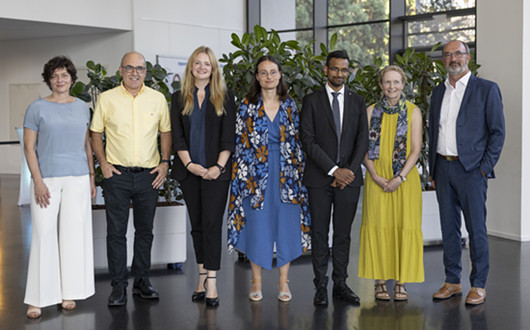Home > News > Eppendorf Award for Young European Investigators 2025 goes to Varun Venkataramani, Germany
Eppendorf Award for Young European Investigators 2025 goes to Varun Venkataramani, Germany
- (Hamburg, 7 July 2025) This year, the Hamburg based life sicences company Eppendorf SE is awarding its prestigious research prize for the 30th time. The independent jury chaired by Prof. Laura Machesky, Cambridge, UK, selected Dr. Varun Venkataramani, Heidelberg University Hospital, Germany as the winner of the Eppendorf Award for Young European Investigators 2025.
Varun Venkataramani receives the 20,000 Euro award for his research on how synaptic neuron-tumour networks can drive brain tumour progression. The jury acknowledged the importance of the emerging field of neuro-oncology and Dr Venkataramani’s role in unravelling how neurons and tumours interact and the translational potential of this work.

People on the picture from left to right: Christine Munz, Sir Stephen Jackson, Fena Ochs, Juliette Fedry, Laura Machesky, Axel Jahns
Varun Venkataramani: „ I am deeply honored and grateful to receive the 2025 Eppendorf Award for Young European Investigators. This recognition reflects the dedication and innovative spirit of my entire research team, whose tireless efforts have made our discoveries possible. I extend my sincere thanks to my mentors, collaborators, and family for their unwavering support throughout this journey.”
The award acknowledges the important contributions to understanding the complex interplay between neurons and cancer cells in brain tumors, revealing how cancer cells form synapses with neurons and exploit neuronal mechanisms for tumor growth and invasion. These findings are establishing cancer neuroscience as a new field at the intersection of neuroscience and oncology, which will potentially lead to neuroscience-instructed treatment strategies for patients with brain tumors, for whom current therapeutic options remain limited.
In addition to the winner of the Eppendorf Award 2025, two finalists were honored.
Fena Ochs, Group Leader at the Biotech research & Innovation Centre at the University of Copenhagen, Denmark is honored for her contribution to our understanding of how cohesin mediates sister chromatid cohesion. The jury panel was impressed by Dr Ochs’ innovative and mechanistic studies that helped to resolve how human cohesin works as a monomer to bind sister chromatids together and her single molecule studies of 3D chromatin. The jury acknowledged the relevance of her studies to age-related infertility and to our understanding of chromatin organization.
Juliette Fedry, Group Leader at the MRC Laboratory of Molecular Biology, Cambridge, UK, is honored for her use of innovative techniques to reveal how cellular stress controls protein translation. The jury panel was impressed with her FIB CryoET work, which is revealing how proteins are translated in healthy and diseased tissues at unprecedented resolution and in a physiologically relevant setting
The Award Ceremony took place on July 3, 2025 at the Advanced Training Center of the European Molecular Biology Laboratory (EMBL) in Heidelberg, Germany.
Further information on application modalities, selection criteria and previous winners of the Eppendorf Award for Young European Investigators can be found at www.eppendorf.com/award.
With the Eppendorf Award for Young European Investigators, which was established in 1995, Eppendorf SE honors outstanding work in biomedical research and supports young scientists in Europe up to the age of 35. The Eppendorf Award is presented in partnership with the scientific journal Nature. The Award winner is selected by an independent committee composed of Laura Machesky (University of Cambridge, UK), Sadaf Farooqi (Wellcome-MRC Institute of Metabolic Science, Cambridge, UK), Madeline Lancaster (MRC Laboratory of Molecular Biology, Cambridge, UK), Ben Lehner ((Wellcome Sanger Institute, Cambridge, UK; Center for Genomic Regulation PRBB, Barcelona, Spanien), Stefan Raunser (Max-Planck-Institut für Molekulare Physiologie, Dortmund) und Michael Sixt (Institute of Science and Technology Austria ISTA, Klosterneuburg, Austria).
About the Eppendorf Group (www.eppendorf.com)
Eppendorf is a leading international life science company that develops, manufactures, and distributes instruments, consumables, and services for use in laboratories around the world.
The product portfolio of the business units Liquid Handling & Consumables, Separation & Instrumentation and Bioprocess includes, for example, pipettes, pipette tips, centrifuges, mixers, ultra-freezers and bioreactors for cell and gene research. In addition, Eppendorf offers a wide range of high-quality consumables. In fiscal year 2024, the Eppendorf Group recorded consolidated revenue of €980.3 million and invested €69 million in research and development (R&D).
Eppendorf products are used in academic or industrial research laboratories, such as pharmaceutical, biotech, chemical, and food industries, as well as clinical, environmental, forensic, and industrial laboratories for process analysis, production, and quality assurance.
Since 1945, the Eppendorf Group has been headquartered in Hamburg, Germany, and today operates production and R&D sites in Europe, Asia and North America and has subsidiaries in more than 30 countries. Today, the Group employs around 4,500 people worldwide. They all act in accordance with the purpose of the company's founders: to improve human living conditions.
Related News
- Wnt3a Cytokine: A Multidimensional Exploration from Molecular Characteristics to 12/31/2026
- CD146 Antibodies: Targeting Lipid Metabolism and Energy Homeostasis to Intervene 1/23/2026
- Be Prepared for 2026 Weather Extremes Says Cold Chain Technologies 1/23/2026
- MetP Pharma’s Enabling Technology Creates a New Brain-Targeted GLP-1 Opportunity 1/23/2026
- INTEGRA launches lab evolution automation competition 1/22/2026
- SP263: A Key Tool in Immunohistochemical Labeling 1/22/2026
- Quoin Pharmaceuticals Files Breakthrough Medicine Designation Application in Sau 1/21/2026
- Neurizon Secures Global Trademark Protection Across Key Markets 1/21/2026
- CD170 Antibody: How to Block the Tumor Immune Escape Mechanism Mediated by Myelo 1/21/2026
- Effect of iPS Cell Culture Medium on Differentiation Efficiency 1/21/2026


